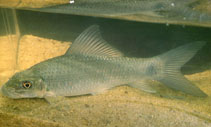| Family: |
Cyprinidae (Minnows or carps), subfamily: Labeoninae |
| Max. size: |
75 cm SL (male/unsexed); max.weight: 5,000.0 g |
| Environment: |
benthopelagic; freshwater, potamodromous |
| Distribution: |
Africa: very widespread, within the drainage basin of the Nile (Ref. 1440, 2801, 28714), Chad, Niger-Bénoué, Volta, Senegal and Gambia basins, as well as Cross River (Ref. 1440, 2940, 81282). Report from Cameroon coastal rivers (Ref. 1440) unconfirmed in Ref 81639. Not reliable known from the Congo River basin (Ref. 1440) and one controversial record from the East coast of Africa (Ref. 1440). Ref. 2801 reports presence in Warri (Nigeria) and Kingani (Tanzania). |
| Diagnosis: |
Dorsal soft rays (total): 15-19; Anal soft rays: 8-11; Vertebrae: 31-33. Diagnosis: dorsal profile straight to slightly arched; body dark and dull; rostral lobe poorly developed, its free margin smooth (Ref. 2940, 81282). Distal margin of dorsal fin straight or convex; inner surface of lips with 4-10 transverse folds or costae (Ref. 2940, 28714, 81282). Inferior mouth with well-developed lips forming a sucker-like ring enclosing the jaws; snout typically swollen, as long as or much longer than the postocular part of the head (Ref. 28714). Body not cylindriform, its depth 27-39% of SL (Ref. 28714) or 2.3-3.3 times in SL (Ref. 2940, 81282). Depth of caudal peduncle 0.7-1.3x its length; 26-46 (50-150mm) and 37-47 (150-250mm) gill rakers; scale formula 5.5-7.5/36-40/6.5-7.5; 4.5 scales between lateral line and pelvic-fin base; 16 (18) scales around caudal peduncle (Ref. 2940, 81282). 11-14 dorsal fin branched rays (Ref. 2940, 28714, 81282).
Description: large species; mouth inferior with small posterior barbel at corner of mouth, anterior barbel visible in young, but disappearing with age; distal margin of dorsal fin straight or convex (Ref. 2940, 26190, 81282), some forms with strongly rounded dorsal fin were described as L. pseudocoubie; D:IV,12-15; A:III,5; P:17-19; V:9 (Ref. 2940, 81282). Eyes in superolateral position (Ref. 26190).
Coloration: general appearance dark; back and sides greyish-blue to blackish-maux; belly light; fins blackish or slate-colored; scales on sides bluish-black with mauve or red centre; juveniles grey with scale rows separated by dark, undulate longitudinal lines; a large, round blotch on caudal peduncle (Ref. 2940, 81282). |
| Biology: |
Inhabit rivers (Ref. 4967). |
| IUCN Red List Status: |
Least Concern (LC); Date assessed: 26 March 2020 Ref. (130435)
|
| Threat to humans: |
harmless |
Source and more info: www.fishbase.org. For personal, classroom, and other internal use only. Not for publication.
